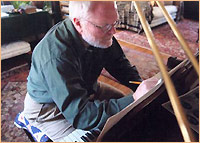|
Douglas Johnson, associate
professor of music, studied in
Vienna, Austria, and earned a
Ph.D. in music at the
University of California,
Berkeley, where he worked with
composers Andrew Imbrie and
Olly Wilson. In 1998, the
Berlin Saxophone Quartet
recorded his "four traveling
musicians site on the platform
waiting for their train as
evening approaches" on the BIT
Musik Label. His string
quartet ‘il terzodecimo
canto,’ had its premiere at
Trinity in 1999, was performed
in Boston by the New England
String Ensemble Quartet in
2000, and was performed in
Italy in 2001. Johnson's most
recent composition, "Palabra,
Obra y Corazon, cinco poemas
de Medardo Arias-Satizábal,"
premiered at the Longy School
of Music in March 2003.
Selections from a new studio
recording of three pieces,
made last year by the original
and commissioning performers
of the works, may be heard
below.
Scherzo from "...at
evening, in the shadow of the
volcano they are dancing..."
(1993)
Anthony de Bedts, piano,
studio recording, July 2001
"...at evening, in the
shadow of the volcano, they
are dancing..."
was commissioned by Anthony
deBedts, a pianist residing in
Vienna, Austria. It is a
one-movement composition
lasting some 12 minutes in
all, premiered in recital at
the Schubertsaal in the
Konzerthaus in March 1993. The
excerpt here comes about one
third of the way through,
after a turbulent opening
section. It is part of a
bouncy scherzo section,
written in odd meters with
quick changes, and calls for a
virtuoso piano technique."
from "Songs of Time, of
Love, of Wonder" (1995):
The Love a Life can Show Below"
(Emily Dickinson)
Elizabeth Anker, contralto;
and Leslie Amper, piano;
studio recording, October 2001
This excerpt is the final
phrase of the third song of
the cycle. It acts as the
pivotal song, as the texts of
the poems have been gradually
drawing our attention away
from the earth and up to the
skies. The vocal line is
simple at first, then opens
into a broad melisma at the
moment when the poem reveals
what love has the power to
accomplish. The accompaniment
exploits the entire range of
the piano, and the
reverberation of the long last
chord connects to the next
song in the cycle, which
starts out with images of a
starry night. The cycle was
commissioned by Ms. Elizabeth
Anker, contralto.
excerpt from "Il
terzodecimo canto" (1999)
The New England String
Ensemble Quartet, studio
recording, October, 2001
"Il terzodecimo canto" is
a string quartet composed as a
musical realization of, and
also a musical commentary on,
the 13th Canto of Dante's
"Divine Comedy," the canto of
the suicides. In this excerpt,
the main character, Pier della
Vigna, a statesman in the
court of the emperor Frederick
the Second, recounts the fate
of the souls in this section
of hell.
back to top
Trinity College Reporter
Spring 2003 Table of
Contents
|
|
 |
"My music seeks an
immediate connection
with listeners'
emotions, with their
bodies, and with their
minds. I compose for
'now,' to communicate
with people around me
in the big 'here' that
our world is. My
compositions are based
in the sound of
acoustic instruments
and the human voice. I
seek to emphasize the
emotional appeal that
sounds have for the
listeners, whatever
their background or
training. The
expressive effect
produced by familiar
musical content in
unexpected contexts
gives my music its
sustaining energy. My
music is American in
that it is an ongoing
conversation between
the past and the
present, between 'old'
sounds and 'new'
sounds." |
|
|


